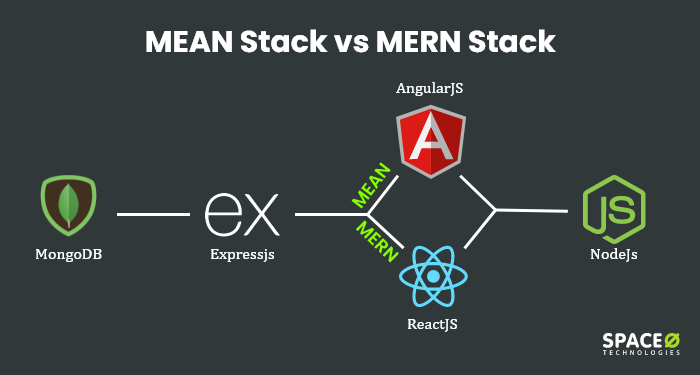
Comparing MEAN and MERN Stacks
Introduction
MEAN (MongoDB, Express.js, Angular, Node.js) and MERN (MongoDB, Express.js, React, Node.js) are two popular JavaScript-based full-stack development frameworks. Both stacks are designed for building modern web applications but have key differences in architecture and usability.
Technology Stack Comparison
| Component | MEAN Stack | MERN Stack |
|---|---|---|
| Database | MongoDB | MongoDB |
| Backend | Express.js | Express.js |
| Frontend | Angular | React |
| Server | Node.js | Node.js |
Key Differences
1. Frontend Framework
- MEAN: Uses Angular, a TypeScript-based framework developed by Google. It follows a structured, component-based approach with built-in two-way data binding.
- MERN: Uses React, a JavaScript library developed by Facebook. It follows a flexible, component-based approach with a virtual DOM for efficient UI updates.
2. Learning Curve
- MEAN: Requires knowledge of TypeScript and Angular-specific concepts such as modules, services, and dependency injection.
- MERN: More beginner-friendly as React primarily uses JavaScript with JSX, making it easier for developers to transition from basic JavaScript.
3. Performance & Scalability
- MEAN: Angular’s two-way data binding can sometimes lead to performance bottlenecks in complex applications.
- MERN: React’s virtual DOM and one-way data flow make it more efficient in handling dynamic UI updates.
4. Community & Ecosystem
- MEAN: Has strong enterprise adoption, especially for large-scale applications due to Angular’s structured framework.
- MERN: More popular among startups and modern web applications due to React’s flexibility and growing ecosystem.
When to Choose MEAN or MERN?
- Choose MEAN if you prefer a structured framework with TypeScript and need built-in functionalities like form validation and routing.
- Choose MERN if you prefer flexibility, a dynamic UI, and a large React ecosystem with third-party libraries.
Conclusion
Both MEAN and MERN have their advantages depending on the project requirements. MEAN is ideal for enterprise-level applications requiring a structured approach, while MERN is better suited for dynamic, interactive UIs with high performance.
